“A clear sentence is no accident.” — William Zinsser
I attended journalism school at Iowa State University, studying newspaper writing and editing from Giles Fowler and ethics from Professor Barbara Mack.
The Greenlee School of Journalism’s newspaper was the award-winning Iowa State Daily. Five days a week, the staff of full-time students put out a newspaper with university, city, arts, features and sports news.
As a journalist and editor, I approach my work in the “old school” way.
- Research.
- Interview.
- Write.
- Fact check.
- Revise.
- Research and fact check more.
But most importantly, I approach writing with a core sense of story.
Why Stories Matter

While journalists report on news and events, they have a key role: telling a story.
Individuals have a drive to not only tell their own stories, but to read, hear and understand others’ experiences. When we tell stories, we create
- empathy
- a sense of commonality
- an understanding of social and historical context
- an expanded sense of self and identity
- a clearer sense of “place”
From news to blogs, story telling reaches readers and makes human connection. A journalists role is to seek out the stories that need to be told, and to tell them with empathy.
When the concept of objectivity originally evolved, it did not imply that journalists were free of bias. It called, rather, for a consistent method of testing information a transparent approach to evidence“ precisely so that personal and cultural biases would not undermine the accuracy of the work. The method is objective, not the journalist.
— American Press Institute (API)
How Journalism Shapes Us
[Journalism’s] value flows from its purpose, to provide people with verified information they can use to make better decisions, and its practices, the most important of which is a systematic process a discipline of verification“ that journalists use to find not just the facts, but also the truth about the facts.” — API

When a community supports ethical and methodical journalism, the result is a more healthy community. There is an onslaught of information and communication, most which is not verified or tested.
Journalists like myself have been trained in the process of research, balance, verification, ethical use of information and sources, and responsibility to the reading public.
Who I Trained with
The team I trained up with includes:
Reed Landberg, Bloomberg News Global renewable energy & environment team leader
Holli Hartman, attorney
Jennifer Wilson, Author & Health Editor for the Meredith Corporation
Christine Romans, CNN Business News Anchor
Nicole Saylor, Head of the Archive, American Folklife Center, Library of Congress
Troy McCullough, Wall Street Journal Asia Editor
Jennifer Jacobs, Bloomberg News Political Correspondent
Pete Grathoff, Kansas City Star Sports Writer
Colleen Bradford Krantz, Independent Film Director
Becky Waller Bausman, Senior Vice President of Strategy at Duarte, Inc.
Our team learned the ethical, political, and moral necessity of journalism. The free and open press protects the common citizen from unregulated power. It creates a system of checks and balances. A journalist strives to monitor power and maintain independence from those we cover.
But more importantly, the role of journalist is to act as an agent of translation: To transfer information and stories — often in pieces and scattered across departments and geography — to readers. This kind of work allows people to comprehend complex issues, and citizens to vote.
